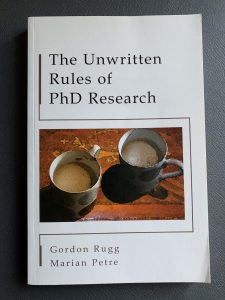Our publications include books, peer-reviewed journal articles and conference papers, and various other media.
Most of our books are written primarily for students. They are typically written in a deliberately informal, accessible style, and explain craft skills and underlying principles in a way that helps the reader understand a topic from the ground up. An example is The Unwritten Rules of PhD Research, by Gordon Rugg and Marian Petre, now in its third edition.
Blind Spot, by Gordon Rugg and Joe D’Agnese, tells the story of our research; how we became fascinated by why people weren’t giving complete and correct information about their requirements for a product, even when their life depended on that product working correctly. The answer we found led to new insights into how best to present information to people; how to spot errors in expert human reasoning about difficult problems; and how best to teach and learn.

Our peer reviewed publications fall into two main groups.
One group is about methods, such as methods for gathering knowledge from people. We focus on methods that are not as well known as they should be; for instance, card sorts, which are very useful for finding out which features of an artefact or process are perceived as important by the people involved. Our papers include tutorials explaining how best to use a method, and descriptions of what happened when we applied a method to an area where it hadn’t been used before.
The other group is about problems we tackled, and what we found. Gordon’s work on the Voynich Manuscript, and Sue’s work on autism, are examples. In both cases, we were looking at ways of spotting errors in expert reasoning about difficult problems, to identify possible new ways forward.
We’ve also published in various other ways, usually to raise awareness of useful concepts and methods, and sometimes to establish the credentials of a concept or method, as part of the bigger picture of our body of work. For example, one of our papers explains why user requirements for a product or system are impossible to know completely and correctly at the start of a project. This has far-reaching implications for how to do project planning and management; there are well established techniques for handling this issue, but the techniques are not as widely known as they should be.
A recurrent feature in our publications is co-authoring with students, using findings from the student’s work. The work is often from undergraduate or MSc projects, not just from PhD students.
Our overall body of work has involved synthesising concepts and methods from a wide range of disciplines, and testing that body of work across a wide range of disciplines. This is reflected in the venues where we’ve published; our work on codebreaking and on autism was published in the top specialist journals for those fields, as a hard test of its validity.
Some of our key peer reviewed publications